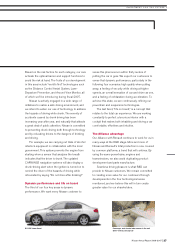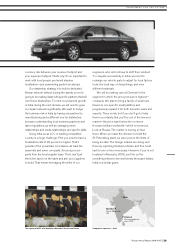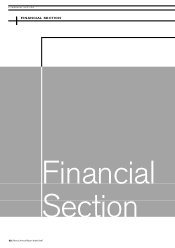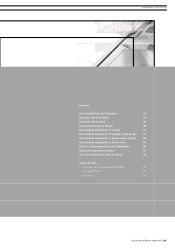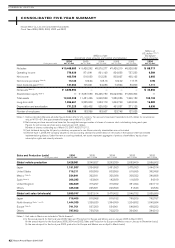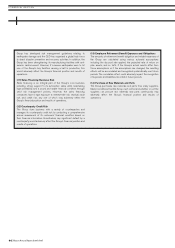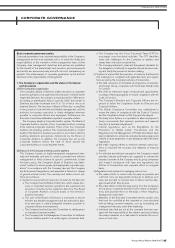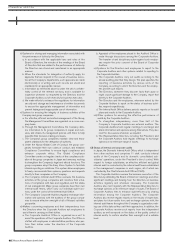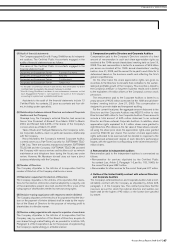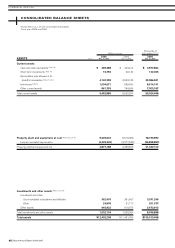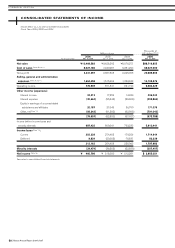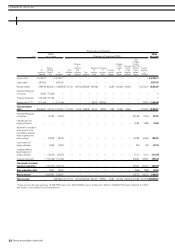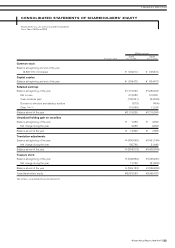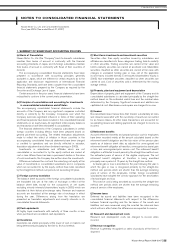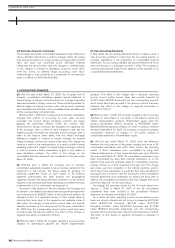Nissan 2007 Annual Report Download - page 48
Download and view the complete annual report
Please find page 48 of the 2007 Nissan annual report below. You can navigate through the pages in the report by either clicking on the pages listed below, or by using the keyword search tool below to find specific information within the annual report.
iv)Systems for storing and managing information associated with
the performance of duties by the Directors
a. In accordance with the applicable laws and rules of the
Board of Directors, the minutes of the meetings of the Board
of Directors that are related to the performance of duties by
the Directors are stored and maintained in an appropriate
manner.
b. When the standards for delegation of authority apply for
approvals that are required in the course of business execu-
tion at the Company’s departments, such approvals are made
electronically or in writing, and such records are stored and
maintained in an appropriate manner.
c. Information as mentioned above is under the strict confiden-
tiality control of the relevant sections, and is available for
inspection whenever so requested by the Directors and the
Corporate Auditors out of necessity for business execution.
d. We make efforts to enhance the regulations for information
security and storage and maintenance of written documents
to ensure the appropriate management of information and
prevent leakage and inappropriate use of information.
v) Systems for ensuring the integrity of business activities at the
Company and group companies
a. For effective, efficient and unified management of the Group,
the Management Committees are organized on a cross-com-
pany basis.
b. Through the Management Committees, the Company deliv-
ers information to its group companies in Japan and over-
seas, and shares its management policies with them to help
expedite their decision-making processes.
c. The Company’s group companies maintain clear and trans-
parent standards for the delegation of authority.
d. Under the Nissan Global Code of Conduct, the group com-
panies formulate their own codes of conduct, and establish
Compliance Committees to ensure legal compliance and
enhance corporate ethics. The Global Compliance
Committee carries out regular checks of the compliance situ-
ation at the group companies in Japan and overseas, working
to strengthen the Company’s legal and ethical functions. The
group companies adopt the Easy Voice System to facilitate
internal reporting on violations. This system allows employees
to freely communicate their opinions, questions and requests
directly to their companies or the Company.
e. The Company’s Internal Audit Office oversees the business
activities at the group companies and monitors their situa-
tions of compliance with laws and regulation, and the status
of risk management. Major group companies have their own
internal audit teams, which carry out individual audit func-
tions, under the control of the Internal Audit Office.
f. The Company’s Corporate Auditors regularly exchange infor-
mation and opinions with the auditors of the group compa-
nies to ensure effective oversight of all of Nissan’s activities
groupwide.
vi) Matters concerning employees and their independency from
the Directors when the Corporate Auditors ask employees to
assist them in carrying out their duties.
a. The Corporate Auditors’ Office is organized as a unit to
assist the operations of the Corporate Auditors. The Office is
staffed with employees in administrative positions, who per-
form their duties under the direction of the Corporate
Auditors.
b. Appraisal of the employees placed in the Auditors’ Office is
made through discussions among the Corporate Auditors.
The transfer of and disciplinary action against such employ-
ees require the prior consent of the Board of Corporate
Auditors.
vii) Systems for the Directors and employees to report to the
Corporate Auditors and other systems related to reporting to
the Corporate Auditors
a. The Corporate Auditors carry out audits according to the
annual auditing plan that they design. The plan specifies the
reporting of business activities by various units of the
Company, according to which the Directors and the employ-
ees provide such reports.
b. The Directors, whenever they discover facts that cause or
might cause significant damage to the Company, report that
directly to the Corporate Auditors.
c. The Directors and the employees, whenever asked by the
Corporate Auditors to report on the status of business activi-
ties, respond expeditiously.
d. The Internal Audit Office delivers periodic reports on its audit
plans and results to the Corporate Auditors.
viii) Other systems for ensuring the effective performance of
audits by the Corporate Auditors
a. To strengthen independency, more than half of the
Company’s Corporate Auditors are external auditors. The
Corporate Auditors hold regular meetings to exchange and
share information and opinions among themselves. They also
meet for discussions whenever so required.
b. The Representative Directors, including the President, and
the Corporate Auditors hold regular meetings to exchange
opinions on an extensive range of issues.
(3) Status of internal and corporate audits
In Japan, the Domestic Internal Audit Office, which is independent
from other sections and comprises 11 staff, conducts internal
audits of the Company’s and its domestic consolidated sub-
sidiaries’ operations, under the President’s direct control. With
respect to foreign subsidiaries, an effective, efficient and global
internal audit is conducted by the internal audit teams established
in the management companies in each region, all of which are
controlled by the Chief Internal Audit Officer (CIAO).
The Corporate Auditors oversee the business execution of the
Directors by attending the Board of Directors’ meetings and other
significant meetings and hearing from the Directors on business
activities regularly and whenever necessary. The Corporate
Auditors also meet regularly with the Representative Directors to
exchange opinions on an extensive range of issues. The Board of
Corporate Auditors tries to enhance audit efficiency by sharing
information among the Corporate Auditors. The Corporate
Auditors also receive regular reports on the results of inspections
and plans for future audits from, and exchange opinions with, the
internal audit teams throughout the Company’s organization, mak-
ing use of this data as they craft their approaches. In addition, the
Corporate Auditors receive such reports from the independent
auditors, as well as reports on the status of the quality control of
internal audits, to confirm whether their oversight is at a suitable
level.
Nissan Annual Report 2006-2007
46
»FINANCIAL SECTION



